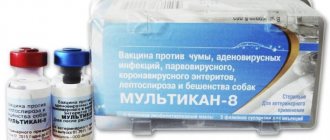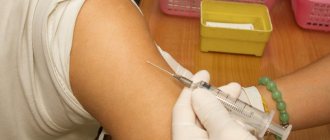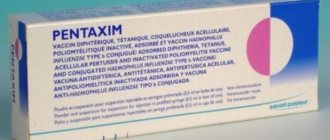| Service | Price |
| ADS-M (prevention of Diphtheria, Tetanus) | 320 rub. |
Diphtheria and tetanus are two diseases that have been well known for a long time. Both are caused by pathogenic bacteria and were quite common before compulsory vaccination campaigns began.
Loeffler's bacillus, also known as Corynebacterium diphtheria, is the causative agent of diphtheria. With this disease, the oral cavity, pharynx, larynx, skin, bronchi, and other parts of the body are affected.
The bacterium Clostridium tetani causes tetanus, an acute disease that affects the nervous system.
The ADS-M vaccine is a multicomponent, specially processed drug. Its administration will not cause negative consequences, intoxication or the occurrence of an infectious disease. After vaccination, the immune system learns to recognize and effectively fight the pathogens of tetanus and diphtheria. A vaccinated person cannot become infected with these serious diseases.
Symptoms of diphtheria and tetanus, what to look for
Both bacteria belong to the pathogenic group of microorganisms that can cause acute infectious diseases. Therefore, an infected person should be immediately isolated to reduce the risk of spreading the infection. You can also become infected with tetanus through contact with sick animals.
Symptoms to look out for so you can take immediate action:
- general weakness of the body, high temperature, enlarged lymph nodes;
- sore throat, difficulty swallowing, swelling of the neck and laryngeal tissues;
- enlarged tonsils and congestion of the pharyngeal mucosa;
- plaque on the tonsils, mucous membrane and adjacent tissues.
Diseases and their complications can cause death, can paralyze the neck muscles, increase the load on the heart and disrupt the functioning of the nervous system.
The following symptoms are typical for tetanus:
- fever, severe weakness;
- muscle tension and spasms throughout the body, especially in the face;
- difficulty breathing;
- spasms that can cause asphyxia and lead to death.
Possible reactions
There is redness, swelling and thickening of the skin at the injection site. After 2-3 days, these symptoms go away on their own. Children may also develop an allergic reaction, which is also normal. If the skin does not recover for a long time, you need to consult a doctor.
Additionally, the child may vomit, have convulsions, general health deteriorates, the temperature rises and symptoms of a cold are observed (cough, redness of the tonsils, sore throat). If the baby’s condition does not stabilize within a few days after vaccination, an urgent consultation with a pediatrician is required.
Sometimes children may complain of leg pain of varying intensity. If the discomfort is mild, nothing needs to be done. In case of severe discomfort, the pediatrician will prescribe special ointments or gels. It is acceptable to use some folk remedies (cabbage leaves, potato peelings). Resorting to self-medication and using painkillers without consulting a doctor is strictly prohibited.
Injecting the vaccine into the leg (thigh) is standard procedure. It is performed quickly and painlessly for children. To find out more information about vaccination, you can study articles on our website, and also contact specialists for advice. By ordering a call back, you can ask all your questions to a specialist. He will offer to sign up for vaccination and undergo a thorough examination.
Time for vaccination
The complex ADS-M vaccine can be administered to a baby in the first three months after birth.
Diphtheria and tetanus are serious, seriously traumatic diseases, often resulting in death. The bacteria that excite them are almost impossible to destroy with modern methods, antibiotics and potent antibacterial drugs. It is a timely vaccination that will help to avoid the disease or reduce the complexity of its course and the severity of the consequences in case of infection.
If the patient did not receive vaccinations against tetanus and diphtheria in childhood, this is not a problem, because protection against dangerous diseases can be acquired as an adult. The drug has no age restrictions.
Importance of vaccination
The causative agent of tetanus - clostridium (tetanus bacillus) is widespread everywhere and is resistant to environmental influences. When the rod enters a child’s body, it releases an exotoxin, which is highly damaging. The course of the disease is lightning fast and very fast. The increase in symptoms occurs instantly, and mortality rates are very high.
Treatment of tetanus is carried out inpatient conditions in intensive care wards. Muscle relaxants are prescribed to relieve seizures. Quite often, patients are transferred to artificial ventilation. The pH level of the blood is adjusted with medication, and support for the functioning of the cardiovascular, excretory and respiratory systems is also required. To prevent secondary infection, antibacterial therapy is carried out.
Parents must clearly understand that even modern medicine is not able to cope with the disease in all cases. Mortality rates remain quite high. The only correct solution is vaccination against tetanus.
ADS-M vaccine - what is it?
The drug is available in the form of a suspension and has a pale yellow color. The usual volume of ampoules is one milliliter, the content of the substance corresponds to a double dose of toxoid.
Indications for vaccination are:
- carrying out the prevention of diphtheria and tetanus after the age of six;
- revaccination of adults, if the last vaccine was used more than 20 years ago;
- the need to replace DPT and ADS drugs due to childhood reactions and complications;
- a missed vaccination in infancy, which requires vaccination at the age of 4 years.
It is worth updating the vaccine every ten years. This will contribute to the formation of stable immunity.
Possible side effects
"ADS" toxoid is one of the least reactogenic drugs. Some vaccinated people may develop short-term general (fever, malaise) and local (pain, hyperemia, infiltration, swelling) reactions in the first two days. Considering the possibility of developing immediate allergic reactions (Quincke's edema, urticaria, polymorphic rash, anaphylactic shock) in particularly sensitive individuals, vaccinated persons must be provided with medical supervision for 30 minutes. Vaccination sites must be provided with anti-shock therapy.
Come get vaccinated at ONNI.
A full range of vaccines for children and adults, family vaccinations - at a special price! Call a doctor at home Make an appointment with a doctor or call +7 (812) 331-17-74
What contraindications and medical exceptions exist for the use of ADS?
Medical exemptions from ADS vaccination are divided into two groups.
Permanent outlets include:
- complications after drug administration;
- strong reaction to the components of the drug during previous vaccination.
Temporary contraindications include:
- pregnancy, lactation period for a nursing mother;
- weakened immunity due to exacerbation of chronic diseases;
- presence of an infectious disease;
- allergy;
- prodromal period, accompanied by poor health, general weakness and aching joints.
You can get vaccinated a month after the allergy ends. For other contraindications, you can get vaccinated immediately after recovery.
A person who does not have artificial immunity against tetanus and diphtheria is at risk. He can either get sick himself or transmit the infection to others; cases of infection in young children with weakened immune systems are especially dangerous. The ADS-M vaccine can prevent death from diphtheria and tetanus.
Is there a fever after vaccination?
A slight increase in temperature after vaccination should not cause alarm. This is how the child’s body can react to the injected substance. The process of processing vaccination antigens and the formation of immunity to the disease occurs. Components are released that cause an increase in temperature.
It should be remembered that any manifestations are individual in nature. Adults and children may react differently.
If the temperature does not rise above 37.5 degrees and lasts no more than 3 days, there is no need to consult a doctor. This is considered a normal reaction of the body. Fever, as a reaction to vaccination, usually appears after 5-7 hours, in some babies the next day. If the temperature lasts longer and an increase is noted, you should seek help, as there may be other causes for this symptom.
Vaccination with ADS-M at the Trit clinic - advantages and comfort
Medical uses only certified drugs with proven effectiveness. Before vaccination, all patients undergo a mandatory medical examination. The selected drugs and compliance with the procedure regulations help reduce the risk of side effects.
Qualified specialists strictly follow the vaccination protocol, which allows us to raise the quality and safety of services to a high level.
Medical staff help protect your health using the most effective methods. We are for a safe future, where the health and lives of patients are not threatened by dangerous infections.
Complications after ADSM vaccination in adults
The adult body reacts less pronouncedly to the administration of the drug. However, complications are also no exception. They can be either a natural reaction or a serious complication due to the individual characteristics of the body.
Standard manifestations of a reaction to ADSM include:
- weakness and drowsiness;
- body temperature rises;
- allergic reaction;
- intestinal disorder;
- redness and swelling at the injection site.
The most dangerous manifestations include neurological reactions manifested in seizures. As a rule, they go away within two weeks. Pharyngitis, rhinitis and other symptoms similar to ARVI often occur. In very rare cases, anaphylactic shock, swelling of the face and loss of consciousness may occur.
It is not recommended to get vaccinated during pregnancy.
ADS-M vaccination schedule for children and adults
The further vaccination schedule with the ADSM vaccine depends on whether you were vaccinated with DTP in childhood.
If there is a pertussis-diphtheria-tetanus vaccination carried out on time, ADSM is administered in the form of revaccinations (r - repeated vaccinations) according to a specific schedule:
- r - No. 2 - for children who have reached 4 or 6 years of age.
- r - No. 3 - carried out 10 years later, after the previous revaccination (at 14-16 or 18 years).
- r - No. 4 - is carried out already in adulthood at 24-26 years.
Each subsequent revaccination can be carried out 10 years later until old age (optional).
In case of individual contraindications to the DTP vaccine , children under 6 years of age are vaccinated with the DTP according to the established schedule:
- at 3-4.5-6 months;
- at 1.5 years - ADS with a booster (additional) dose of the drug is administered to maintain immunity.
Starting from 6 years of age, immune phagocytosis is supported every 10 years by revaccinations of small doses of toxoids contained in the ADS-M . It is during this period that the body maintains resistance to tetanus and diphtheria infections.
Alcohol and vaccination
Alcoholic drinks and the vaccine are not compatible. Two days before the administration of the drug, you must stop drinking alcohol.
After vaccination, you should maintain a sober lifestyle for at least three more days. In the future, a small dose of a low-alcohol drink is acceptable. It is allowed to resume drinking alcohol as usual after a week.
If, however, alcoholic drinks were taken, this may increase the severity of adverse reactions. There is an increase in temperature, pain and swelling in the injection area.










